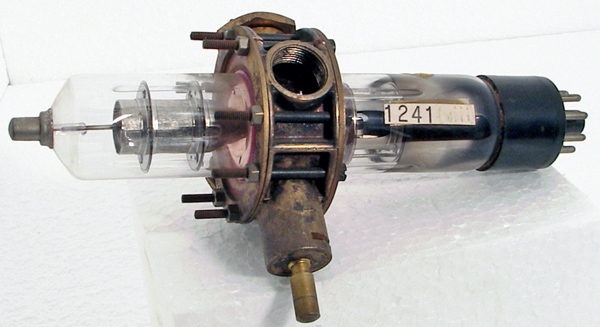|
NR89Sensibly equivalent¶ to:See also:
|
|
|

|
A Signal School FirstNR89 ('Sutton' Tube). The first Microwave Radar local oscillator, developed by R W Sutton at ASE Extension, Bristol.Based on principles originating in 1939 at Stanford University, USA, it gave tens of milliwatts output at frequencies around 3 GHz with an 8% tuning range. Samples were available in Autumn 1940, and used by H W B Skinner in his experimental S-band Radar at Swanage. (This also used Megaw's Magnetron E1189 and a 'Cats Whisker Crystal Mixer' made by Skinner himself).In small scale production at ASEE, EMI and E K Cole from March 1941, it was used in early Type 271 Radar systems.The NR89 was succeeded in 1941 by CV35, REL8 & CV67.It is possible that this exhibit is incorrectly labelled as the NR89 has a very long drift space and this device does not. This exhibit may be a later version reflex klystron.The wide glass tube envelope is 28 mm in diameter and, excluding the IO base pins, is 170 mm tall.References: Private communication & 3002. Type NR89 was first introduced in 1941. See also 1941 adverts. |
Pin Connections
| 1 | 2 | 3 | 4 | 5 | 6 | 7 | 8 | tc |  g1 | h | nc | nc | nc | nc | h | k | r |
|
|
Absolute Maximum Operating Conditions¶
| Vh | 
| 4.0 |
|
Updated January 06, 2022.
|
|